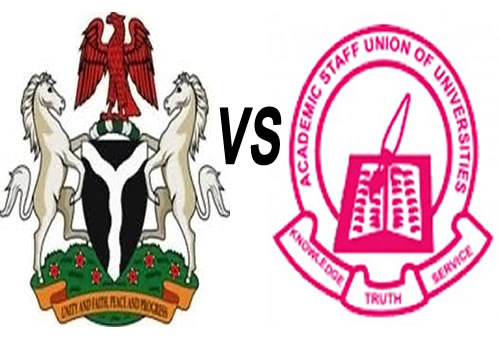NIGERIANS, especially stakeholders in the tertiary education sector, are anxiously awaiting the peaceful resolution of the ongoing impasse between the Academic Staff Union of Universities (ASUU) and its employer, the Federal Government. Last Wednesday, Minister of Labour and Productivity, Chris Ngige, stated that the government had thrashed out seven out of the eight demands put forward by the union, but that its demand for N248 billion earned allowances could not be met. Ngige spoke just as the union ended its one-week warning strike.
However, following the ongoing interface between the Senate ad hoc committee set up by Dr Bukola Saraki, the Senate President and the national executive of ASUU, Nigerians are hoping that the smouldering tension will not explode into another round of wasted years for the nation’s youths. Senator Jibrin Barau, the chairman, Senate Committee on Tertiary Institutions and TETFUND, expressed optimism on a speedy resolution of the impasse. According to him, “We had about six issues and all of them were well discussed. We deliberated and agreed on all of them except one, and that one has to do with earned allowances.”
It is unfortunate that session after session, the nation’s public universities, where the members of ASUU hold sway, continue to be plagued by incessant strikes necessitated by the collapse or non-implementation of agreements reached between the Federal Government and ASUU. The nation is well aware of the fact that strikes occasion loss of valuable time and resources. If anything, the researches that are supposed to be conducted by the striking lecturers are usually not profitably done as research assistants and students who should benefit through participation in such researches are not around to so benefit. Thus, knowledge is not passed on. Also, the students can neither receive lectures nor sit for examinations which will aide their promotion to the next class, and eventual graduation. In the end, the nation is the loser.
Because the global community is aware of the above and many more, for example, graduates of Nigeria’s public institutions are demeaned globally because of the lacuna that these interruptions induce in their academic history. We believe that the Federal Government should be more proactive in implementation or renegotiation of agreements reached not just with ASUU but all component units of the labour sector to avoid needless losses, especially at this time of national lack.
It is unfortunate that a government which constituted its own delegation to interact with the academic union and reached conclusions can turn around to spurn the same agreement years after. Government, we insist, is a continuum and the sitting government must consider it imperative to implement the agreement its predecessors reached with unions if it is to be taken as seriously as any government ought to. For the citizenry to trust the government, the government also has an obligation to honour contractual agreements freely negotiated and entered into with labour unions and other institutions.
We also wish to plead with ASUU not to be obdurate in its demands. Concessions must be made between the two parties in a very reasonable and realistic manner. In a depression such as the one Nigeria is currently battling, each group must temper its demands in a manner that shows that it understands the need to take care of other sectors of the economy with the meager earnings available. A situation where members of the academic community continue to make spurious demands just because some politicians are earning outrageous allowances will not augur well for the country. According to Senator Barau, “ASUU is asking for N62 billion. Initially, N30 billion was given to the universities in 2013 and the agreement as signed between the Federal Government and the ASUU clearly specifies that upon receipt of any payment, before a new payment is made, the last payment has to be accounted for. The Implementation Monitoring Committee (IMC) clearly wrote in one of its letters to the Ministry of Education that it was not satisfied with the level of accountability on the N30 billion.”
We urge ASUU to do all within its powers to comply with the mandate guiding the disbursement. The union should also be careful not to erode the respect it has within the nation as the generality of the students of the poor whose children attend the public institutions where ASUU unionship is still permitted are already fatigued by the economic mess in which the nation has found itself through no fault of theirs. The children of the rich attend private universities in most cases or travel outside the country, paying in dollars. Their underprivileged counterparts have no such opportunity, and are stuck with the public varsities where they spend donkey years and age considerably before graduating.
The Federal Government and ASUU must do the best they can between them to avert another strike after the recent warning strike. Since negotiations have already commenced, we urge both parties to ensure that a compromise is reached in the interest of the nation.
WATCH TOP VIDEOS FROM NIGERIAN TRIBUNE TV
- Relationship Hangout: Public vs Private Proposals – Which Truly Wins in Love?
- “No” Is a Complete Sentence: Why You Should Stop Feeling Guilty
- Relationship Hangout: Friendship Talk 2025 – How to Be a Good Friend & Big Questions on Friendship
- Police Overpower Armed Robbers in Ibadan After Fierce Struggle






